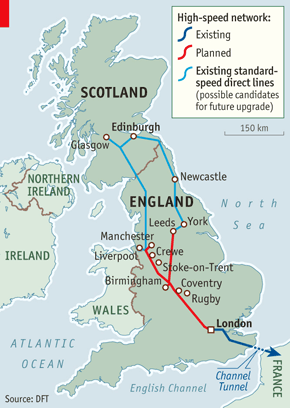The benefits of building a new $52-million HSR that connects London to northern England are plausible but not persuasive, says The Economist.
Largely skeptical of change, the British public is divided on the issue. To the extent that the project will "ameliorate the north-south divide in Britain's economy and prosperity" once it is completed in two decades' time, people simply aren't convinced that either the change is real or the deadline can be met. What's more, some have expressed concerns over the environmental impact that the proposed construction will have in Chilterns, an area about 40 miles northwest of London known for its picturesque view and is home to affluent voters.
The case can be made that there is always a need to build the latest transportation infrastructure. Whether the upgrade, expansion, or replacement of the existing rail network justifies the cost depends in no small part on the urgency of need, particularly for advanced economies like Britain.
From the vantage point of practicality, "Britain's infrastructure demands are different from other countries'. Its regular trains are already faster than most other nations' equivalents. [The country] is sufficiently small that even without pricey futuristic technology, Manchester and Leeds are only just over two hours from London. And a greater proportion of the population is already connected to the road and rail network than elsewhere in Europe."
Calling the proposal a "railroad to nowhere," The Economist points out that the money "at its disposal might well yield a higher return if it were spent on less glitzy schemes, such as road improvements and intra-city transport initiatives."
FULL STORY: Railroad to nowhere

Maui's Vacation Rental Debate Turns Ugly
Verbal attacks, misinformation campaigns and fistfights plague a high-stakes debate to convert thousands of vacation rentals into long-term housing.

Planetizen Federal Action Tracker
A weekly monitor of how Trump’s orders and actions are impacting planners and planning in America.

In Urban Planning, AI Prompting Could be the New Design Thinking
Creativity has long been key to great urban design. What if we see AI as our new creative partner?

King County Supportive Housing Program Offers Hope for Unhoused Residents
The county is taking a ‘Housing First’ approach that prioritizes getting people into housing, then offering wraparound supportive services.

Researchers Use AI to Get Clearer Picture of US Housing
Analysts are using artificial intelligence to supercharge their research by allowing them to comb through data faster. Though these AI tools can be error prone, they save time and housing researchers are optimistic about the future.

Making Shared Micromobility More Inclusive
Cities and shared mobility system operators can do more to include people with disabilities in planning and operations, per a new report.
Urban Design for Planners 1: Software Tools
This six-course series explores essential urban design concepts using open source software and equips planners with the tools they need to participate fully in the urban design process.
Planning for Universal Design
Learn the tools for implementing Universal Design in planning regulations.
planning NEXT
Appalachian Highlands Housing Partners
Mpact (founded as Rail~Volution)
City of Camden Redevelopment Agency
City of Astoria
City of Portland
City of Laramie




























